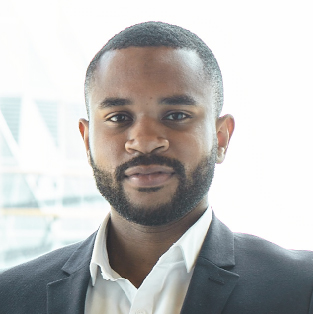From mentorship to leadership
Assimilation into British corporate culture was an uphill process for me, a Bermudian. Fortunately, I’d help from an informal mentor even before I switched to Greenwich Mean Time. I first discussed being a Black professional in a global network of well-kept secrets during a summer internship with HSBC Bermuda. My conversation with Patrick Tannock, now CEO – Insurance at XL Bermuda, ignited a spark in me to achieve as much as he had.
That spark dimmed as I worked part-time in London whilst completing my Masters degree, since the immense diversity at university was not reflected in the businesses we were all so eager to join. Very few people in the London insurance market share experiences similar to mine, but still I chose to stay. Partly I was intrigued by British culture, and partly I wanted to see if I could mentor the next group of diverse talent, just as I was mentored.
From dreams to goals
The spark began to reignite when I met Godwin Sosi at Dive In. Finally I had met a likeminded, young, ambitious Black insurance professional. Since then I’ve immersed myself in the work of the ACIN, and surrounded myself with such people to form a network of mutual mentors and motivators. It will have to be that way until we have the tenure and the leadership roles to serve as individual mentors for the Black talent of the future. That will happen: Black leadership in London was just a dream, but now it’s something more concrete: a goal. A dream becomes a goal when the steps to its realisation have been put in place, and our paths are clear.
It is essential that we get Black leaders to provide role models. I was enabled to envision myself in the place of Patrick Tannock, someone I looked up to, but unfortunately a lot of young Black talent in our industry never finds a mentor like him. The uninspiring retention level of young ethnic talent in insurance must be tied directly to the lack of representation at higher levels of the corporate hierarchy. There are far too few familiar faces – none in many firms – to prove that a dream can be an achievable goal.
Be your best
A piece of advice Mr. Tannock gave me has had resounding influence. He said that who you know gets you in the door, but what you know keeps you there. My parents emphasised work ethic from an early age, and pushed my brother and I to reach our full potential. Your network can open doors, but the proof of the pudding is in the eating. It’s the ingredients you take into yourself that make your career and your work much more meaningful.
Because of this simple truth, dedication to being amongst the best at your craft is even more important for younger Black professionals who may have much shallower networks than that of their non-black counterparts. You get there pursuing qualifications, attending webinars, staying informed by reading technical articles, and always digging deeper into the details. Continued emphasis on improving the origins of your ingredients and adding new ones will strengthen your place in any corporate environment, no matter how many people in the room look like you.
Dreams become goals through planning and action, which in turn are fuelled by the evidence that goals are achievable. The existence of similar, familiar faces in positions of seniority reinforces the sense of achievability. They and their mentorship will be critical to motivating the next generation of leaders by letting them in on the secrets of our business.

Keith Jernigan
Underwriting Assistant
Fidelis

